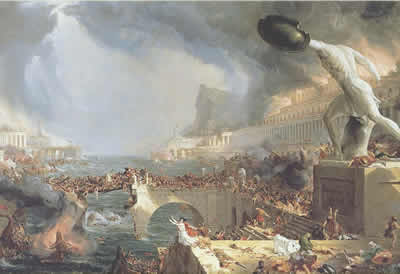This Week in History:
The Sack of Rome
August 19 - 25, 410 A. D.
August 2010
"The Course of Empire: The Destruction" (1836) by Thomas Cole |
This week we take our readers way back, for a very good purpose. One of the leading assertions of the Clash of Civilizations crowd today, is that the United States of America must abandon its republican tradition, and become the "new empire," policing the world, and suppressing economic development wherever someone might suspect a future "challenge" to the United States.
Empires, however, are well-known for their propensity to destroy themselves, and their populations. One need only look at history.
Which brings us to our event of the week, the fall of the Roman Empire. Historians date the collapse of the Western part of the Empire from the moment at which the Visigoth tribes (from Northern Europe) overran Rome on August 24, 410.
This denouement was the result of a long process, through which the Roman Emperors had created the conditions for their own destruction. According to the imperial principle, the Romans had not only conquered as much of the world as they could, they had concentrated on looting the areas which they had taken over, of whatever wealth existed. They took slaves, raw materials, and everything of value they could find, demanding endless tax and tribute.
Thus, instead of building up, or even maintaining, agricultural production in Italy, for example, they imported grain from the hinterlands. Rather than educating their own citizens to become skilled craftsmen, and to come up with inventions and improvements, they suppressed technological innovation, and thus suffered from extremely low productivity, in agriculture, in particular. Indeed, the agriculture estates around Rome were terrible places where slaves were worked to death, only to be replaced by the ceaseless flow of new slaves. In such a slave-based society, there was no need for technological advance or skilled labor.
Thus Rome created a culture by which its citizens destroyed themselves —and it became rotten-ripe for takeover.
In effect, Imperial Rome was the ultimate "consumer" society. Its population was largely unemployed, except for those who fought its wars and policed its far-flung borders, and that vast unemployed population depended upon the state for survival. The idea of people being satisfied with "bread and circuses," the very phrase, comes from the heyday of the Roman Empire, when the Empire sustained the population of Rome on the public dole, and kept them amused with grand, bloody spectacles, provided at the expense of the state. By 354 A.D., shortly before the end, there were 200 official holidays a year in Rome at which the mob was treated to such monstrous "entertainment," and the circuses and arenas were expanded to hold hundreds of thousands of people.
With the population so degraded, is it any wonder they did not rally against the invading "barbarians"?
The modern-day apologists for "Empire" may hope that they can avoid Rome's fate, but in fact, they are doomed, and very soon. Although the postwar United States, especially from 1964 to the present, has increasingly followed both the British imposed ideology and the physical economy of the Roman Empire, we have reached the boundary condition where either a new direction is adopted, or the U.S. will cease to be a Republic. The U.S. has shut down production, brought in tribute from the rest of the world, engaged in wars rather than developing collaborative relations with other sovereign states, allowed certain factions to promote depopulation and genocide against less-developed nations, and watched our own citizens become increasingly entertainment-oriented and ignorant, following the Roman pattern of depopulation, with sexual perversion and hedonism becoming more dominant aspects of the culture.
But the United States is not an empire. We have a Constitution which embodies the republican principle of the general welfare, and a history of fighting for technological progress and against oligarchy which remains embedded among a substantial part of our citizenry and our institutions. To make us into an empire, would be to eviscerate that tradition, and most of civilization, since empires always destroy themselves.
The "sleeping giant" of the real United States is awakening, and the mass strike process which is now exploding, is poised to finally destroy the "Empire" system once and for all, and celebrate humanity's creative development.
The original article was published in the EIR Online’s Electronic Intelligence Weekly, as part of an ongoing series on history, with a special emphasis on American history. We are reprinting and updating these articles now to assist our readers in understanding of the American System of Economy.

